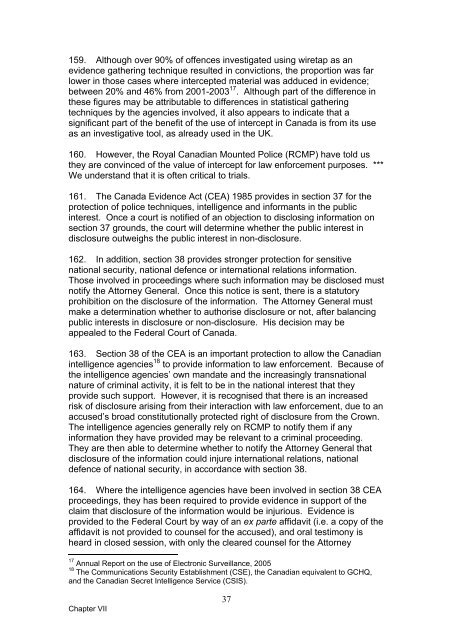Privy Council Review of intercept as evidence: report - Official ...
Privy Council Review of intercept as evidence: report - Official ...
Privy Council Review of intercept as evidence: report - Official ...
Create successful ePaper yourself
Turn your PDF publications into a flip-book with our unique Google optimized e-Paper software.
159. Although over 90% <strong>of</strong> <strong>of</strong>fences investigated using wiretap <strong>as</strong> an<br />
<strong>evidence</strong> gathering technique resulted in convictions, the proportion w<strong>as</strong> far<br />
lower in those c<strong>as</strong>es where <strong>intercept</strong>ed material w<strong>as</strong> adduced in <strong>evidence</strong>;<br />
between 20% and 46% from 2001-2003 17 . Although part <strong>of</strong> the difference in<br />
these figures may be attributable to differences in statistical gathering<br />
techniques by the agencies involved, it also appears to indicate that a<br />
significant part <strong>of</strong> the benefit <strong>of</strong> the use <strong>of</strong> <strong>intercept</strong> in Canada is from its use<br />
<strong>as</strong> an investigative tool, <strong>as</strong> already used in the UK.<br />
160. However, the Royal Canadian Mounted Police (RCMP) have told us<br />
they are convinced <strong>of</strong> the value <strong>of</strong> <strong>intercept</strong> for law enforcement purposes. ***<br />
We understand that it is <strong>of</strong>ten critical to trials.<br />
161. The Canada Evidence Act (CEA) 1985 provides in section 37 for the<br />
protection <strong>of</strong> police techniques, intelligence and informants in the public<br />
interest. Once a court is notified <strong>of</strong> an objection to disclosing information on<br />
section 37 grounds, the court will determine whether the public interest in<br />
disclosure outweighs the public interest in non-disclosure.<br />
162. In addition, section 38 provides stronger protection for sensitive<br />
national security, national defence or international relations information.<br />
Those involved in proceedings where such information may be disclosed must<br />
notify the Attorney General. Once this notice is sent, there is a statutory<br />
prohibition on the disclosure <strong>of</strong> the information. The Attorney General must<br />
make a determination whether to authorise disclosure or not, after balancing<br />
public interests in disclosure or non-disclosure. His decision may be<br />
appealed to the Federal Court <strong>of</strong> Canada.<br />
163. Section 38 <strong>of</strong> the CEA is an important protection to allow the Canadian<br />
intelligence agencies 18 to provide information to law enforcement. Because <strong>of</strong><br />
the intelligence agencies’ own mandate and the incre<strong>as</strong>ingly transnational<br />
nature <strong>of</strong> criminal activity, it is felt to be in the national interest that they<br />
provide such support. However, it is recognised that there is an incre<strong>as</strong>ed<br />
risk <strong>of</strong> disclosure arising from their interaction with law enforcement, due to an<br />
accused’s broad constitutionally protected right <strong>of</strong> disclosure from the Crown.<br />
The intelligence agencies generally rely on RCMP to notify them if any<br />
information they have provided may be relevant to a criminal proceeding.<br />
They are then able to determine whether to notify the Attorney General that<br />
disclosure <strong>of</strong> the information could injure international relations, national<br />
defence <strong>of</strong> national security, in accordance with section 38.<br />
164. Where the intelligence agencies have been involved in section 38 CEA<br />
proceedings, they h<strong>as</strong> been required to provide <strong>evidence</strong> in support <strong>of</strong> the<br />
claim that disclosure <strong>of</strong> the information would be injurious. Evidence is<br />
provided to the Federal Court by way <strong>of</strong> an ex parte affidavit (i.e. a copy <strong>of</strong> the<br />
affidavit is not provided to counsel for the accused), and oral testimony is<br />
heard in closed session, with only the cleared counsel for the Attorney<br />
17 Annual Report on the use <strong>of</strong> Electronic Surveillance, 2005<br />
18 The Communications Security Establishment (CSE), the Canadian equivalent to GCHQ,<br />
and the Canadian Secret Intelligence Service (CSIS).<br />
Chapter VII<br />
37
















